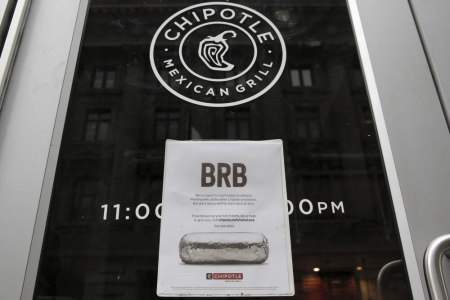Chipotle's Organic Food: What Should Christians Eat?

Last year was rough for the fast food chain Chipotle Mexican Grill. Organic beans, rice, tofu: these foods feature prominently in the menu. In 2012 Chipotle purchased almost 7 million pounds of organic black beans.
While Chipotle is not 100 percent organic, the organic label is an important piece of their growth strategy. It's great for business. Organic food sales in America — Chipotle is part of this — have risen by about twenty percent annually, making this the fastest growing slice of the food market.

But then came an E. coli outbreak that sickened scores of Americans. The toxic media fallout threatened the very existence of Chipotle. More outbreaks — six in six months — settled the idea that Chipotle had food safety problems.
Bill Marler, a lawyer specializing in food-borne illness, wrote, "I just think they were so focused on their mission to serve food with integrity, as defined by their commitment to local, organic, non-GMO, and humanely raised food, that they used those words as a proxy for safe food. I think they believed, and probably people did too, that it was true. If you asked people six months ago whether they thought McDonald's or Chipotle was safer, more than 90 percent of people would have said Chipotle in an instant."
Chipotle advertising before and since the crisis promises "Food with Integrity." This is an interesting choice for a marketing slogan. Would anyone in their right mind want to eat food at a restaurant without integrity?
Chipotle frames the consumer choice as a moral one and uses a form of virtue signaling to draw customers. "We're good and moral and if you buy our food you're good too."
It's a smart marketing strategy. It recognizes that a culture obsessed with outward appearance of virtue will purchase more of a product they believe demonstrates virtue.
In short, customers buy more Chipotle when they identify with trigger words like organic, natural, locally sourced, sustainable, non-GMO, and so on.
Whatever the future holds for Chipotle the case raises interesting cultural questions.
In developed nations organic food seems largely a fad of the wealthy. By contrast in poor nations there is frequently no choice — everyone eats organic because cow dung, with its E. Coli, is often all there is to fertilize crops. Nearly all of Africa's farms live the slow food dream and are de facto "organic."
When people decide how to eat healthier, get more nutrition from their diet, or maintain a normal weight, they consider many factors. Whatever the pros and cons, there is nothing inherently wrong with a preference to eat food fertilized with cow manure rather than with a nonbiological fertilizer.
Do organic veggies taste better? Most people say yes. But when scientific blind tests are run, there is no taste advantage to organic foods. However, when test subjects taste and score identical foods, some classified by virtue-signaling words like organic or Fairtrade, they give significantly higher scores to foods those.
Why, in wealthy nations, is this food market growing so fast? Organic food is typically 50 percent more expensive than alternatives. It is clearly not an economic decision. Something greater enters into decision making, something moral, even spiritual.
Perhaps it is because organic is associated with "natural." Who wants to eat something labeled chemical, modified, synthetic, or unnatural?
Whether the visceral reaction is correct or not is beside the point. Organic food gets the benefit of the doubt and is generally considered pure, good, just the way God made it, because it is unsullied by the "improvements" of humans.
But in fact, all things being equal organic food is not necessarily more health giving. Organic produce contains natural pesticides, usually more than in produce grown using conventional pest management. At least, with conventional produce, one can wash off synthetic pesticide residues.
Both conventional and organic foods contain dangerous toxins: apples contain estragole and apple seeds contain cyanide; coffee contains benzene and other carcinogens; arugula and various other green vegetables contain allyl isothiocyanate; grapes contain caffeic acid; red wine contains ethyl carbamate; and so on. Natural pesticides like these typically account for 99.9 percent of our daily pesticide intake, the synthetic residues for the rest.
One can quickly recognize the moral and religious aspect of the organic food fad by a simple experiment. Try questioning the rationale of organic food at your local raw, whole, or organic market (or your church) and discover, as one reporter did, that some find this "not just akin to doubting the virtues of motherhood, but to reveal indifference to the poisoning of the nation and the fate of the planet."
The assumption that Mother Nature always knows best is an important factor in the explosive growth in the organic market. For many it's no longer just about food but about a sense of moral satisfaction, even a kind of righteousness.





















